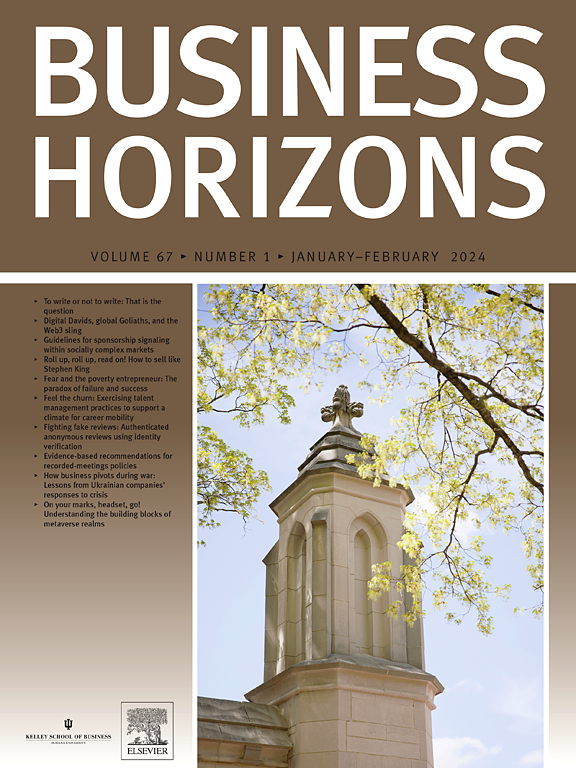解读和平红利:对哥伦比亚九个城市的商业、和平与经济增长之间关系的国家以下各级分析
IF 7
3区 管理学
Q1 BUSINESS
引用次数: 0
摘要
7 年前哥伦比亚签署和平协议后,私营部门对和平红利的期望很高。这一红利在多大程度上实现了,不同地区和城市的公司在经济方面有哪些经验?为了评估和平协议对关键指标的影响,我们对协议签署后的哥伦比亚进行了次国家分析。我们考察了九个城市,并创建了一个模型来确定冲突(以哥伦比亚国家受害者单位发布的受害风险指数为代表)与企业动态变量之间的关系。我们发现,受害风险指数较高的城市往往商业动态得分较低。我们将商业动态模型的结果与波哥大商会(CCB)2018 年进行的一项调查的结果进行了比对。这一对比证实,受冲突影响最严重的大多数地区在观念和现实上都拥有最大的和平红利。和平不会使全国各地的所有船只一帆风顺。政策制定者可以利用这些见解来确定他们的期望值,并制定更有效的政策和干预措施,以应对建立和平的挑战以及和平为私营部门带来的机遇。本文章由计算机程序翻译,如有差异,请以英文原文为准。
Unpacking the peace dividend: A subnational analysis of the relationship between business, peace, and economic growth in nine Colombian cities
After the signing of a peace agreement in Colombia 7 years ago, expectations of a peace dividend for the private sector ran high. To what extent has this dividend materialized, and what have been the experiences of companies in different regions and cities of the economy? To evaluate the impact of the peace agreement on key indicators, we conducted a subnational analysis in post-agreement Colombia. We examined nine cities and created a model to determine the relationship between the conflict—represented by the Victimization Risk Index released by the Colombian national victim’s unit—and a business dynamic variable. We found that the cities presenting a higher VRI tend to have lower business dynamic scores. We paired the findings from our business dynamics model with the results of a survey conducted in 2018 by the Bogotá Chamber of Commerce (CCB). This comparison confirms that the majority of the regions most affected by the conflict had the largest peace dividend both in terms of perception and in reality. Peace will not lift all boats across the country evenly. Policymakers can leverage these insights to ground their expectations and devise more effective policies and interventions capable of navigating the challenges of peacemaking and the opportunities peace can offer the private sector.
求助全文
通过发布文献求助,成功后即可免费获取论文全文。
去求助
来源期刊

Business Horizons
BUSINESS-
CiteScore
17.70
自引率
5.40%
发文量
105
期刊介绍:
Business Horizons, the bimonthly journal of the Kelley School of Business at Indiana University, is dedicated to publishing original articles that appeal to both business academics and practitioners. Our editorial focus is on covering a diverse array of topics within the broader field of business, with a particular emphasis on identifying critical business issues and proposing practical solutions. Our goal is to inspire readers to approach business practices from new and innovative perspectives. Business Horizons occupies a distinctive position among business publications by offering articles that strike a balance between academic rigor and practical relevance. As such, our articles are grounded in scholarly research yet presented in a clear and accessible format, making them relevant to a broad audience within the business community.
 求助内容:
求助内容: 应助结果提醒方式:
应助结果提醒方式:


